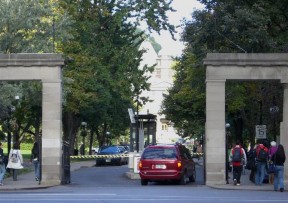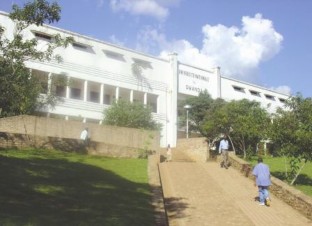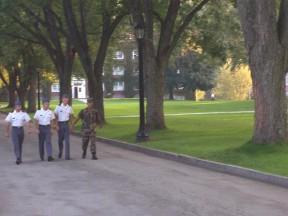
In a recent discussion in the Computer Security Incident Response Team Management course of the MSIA that I’d been leading from June to August 2007, a student told a wonderful story of helping a formerly homeless man in one of his college courses reclaim a sense of personal worth. The other students expressed appreciation for their colleague’s commitment to teaching and specifically asked me if the pleasure that their fellow student had felt in watching his student progress was something that I also felt.
I promised to respond and am therefore thinking and writing about my own career as a teacher.

Sometimes I marvel at what a strange child I must have been. From my perspective, I knew only that the other children considered me weird, but I always thought of myself as normal. I had completed high school math by the age of nine and had always been happy to help my fellow students, very few of whom I could call friends, with their arithmetic and then with elementary algebra and geometry problems. Helping people learn stuff was one of the few ways in which I could ingratiate myself to an otherwise hostile group of Anglos who generally despised me for being a French-speaking kid with a strong French accent who had the vocabulary of a college professor – albeit a frequently mispronounced vocabulary.
![]()
It seemed perfectly reasonable to me at the age of 13, in grade nine, to stand in front of the 1100 students at Westmount high school one day at the school assembly and announce that I was going to teach classes in how to use the slide rule. I had been walking around with my Pickett Model N4-ES Vector-Type Log-Log Dual-Base Speed Rule for some time (the case still shows the childish hand in which I wrote, Ex pondere et numero veritas – “From numbers and measurements, truth”) and the high school seniors were already calling me “Slide Rule” as a nickname. Unfortunately, my first foray into group teaching didn’t go very well: I insisted on trying to explain logarithms as the basis for how the slide rule worked and the room cleared very quickly. In later years, I learned always to start with practical stuff and then work into theory later.
In the summer of 1964, before I began grade ten, I began tutoring some grade 11 students (seniors) who had failed their matriculation algebra examinations. I found the experience exhilarating. Many of these students had rudimentary math skills; they could barely add and subtract, let alone solve practical problems. I never felt superior to them; I just felt sorry that they had been dragged so far with such a muddled grasp of the basics. I remember having to explain to one of these huge football stars why I was drilling him on basic arithmetic; he grumpily accepted my argument that without practice he was never going to be able to move on to the next stages of algebra. I certainly had a strong motivation to help my students succeed: I charged the princely sum of $7 an hour for my tutoring even though the high school teachers were charging only $3.50. The difference was that if my students didn’t pass their makeup exam in August, they wouldn’t pay me. They passed.
My weird, unpopular friends and I were physics lab assistants and chemistry lab assistants as well as members of the model parliament and of the debating team; in other words, we were classic geeks and nerds, generally unwilling to participate in organized sports, woefully ignorant of popular culture, and not very good at pretending that we were sorry about our failings. Instead of listening to the Beatles when I was 13 (in 1963), I was memorizing Bartòk string quartets, singing Orff’s Carmina Burana and discussing the virtues of Schoenberg versus Alban Berg.
Popular guy, eh?

![]()
On the whole, life in high school was about as bad as what I now know most people experienced in different ways. In my case, daily life included being beaten up or at least threatened by the reform-school kids and being called a queer/fag/fairy by the rich kids. You will understand why I have been involved in civil rights action for the rest of my life; I’m not black, but I’m a Life Member of the NAACP. I’m not gay, but I have marched in Gay Pride parades every year since 1988. I don’t think the bullies would understand that, but I think anyone who’s been on the wrong end of bullying will know exactly how I feel about prejudice and persecution.
I was not sorry to leave Westmount High School. At McGill University, I had terrible grades.
From having been 10th in the province of Québec with a 92.5% matriculation average I fell to the bottom of the C- grade. It took four years for me to figure out that doing badly was my unconscious rebellion against the domineering father who had punished me throughout childhood every time I came home with a less than perfect exam score. I still remember the
time my report card read 100%, 100%, 100%,
100%, 100%, 99%, 100%, 100%, 100% – and he
yelled abuse at me for three days for being a fool

![]()
and an idiot in missing that one answer on one of the tests. However, I eventually did figure it out and did much better in my masters at McGill (1970-1972) and doctoral program at Dartmouth (1972-1976).
Decades later, with the help of a psychotherapist, I finally grasped that poor Ilya Kabashnikoff (Father changed his long name in 1932), having seen family members slaughtered in the Russian Revolution and also in the Holocaust, only wanted to protect us by giving us a way to earn a living even under the worst circumstances. He dearly wanted me to be a doctor. Too bad I still hated him when he died in 1973, but I eventually mellowed as I grew older.

I was a lab assistant at Dartmouth and enjoyed those experiences (except the time in Dr Copenhaver’s biochemistry lab when I forgot to test the pH of a buffer I made up and ended up pickling all the lab specimens students were working on – talk about embarrassing!). I was the only graduate student up to that time who had ever created his own graduate course: I decided that I wanted my fellow graduate students to learn about applied statistics (one of my favorite topics even today) and so I got permission to hold weekly sessions with a small group.
![]()
After I got my PhD in 1976, I taught for two years at Université Nationale du Rwanda in Butare, Rwanda. Those were fascinating years for me; I worked very hard with the students to help them master applied statistics in the Faculté des sciences économiques et sociales and in the Faculté d’agronomie. I remember shortly after I arrived but before I could begin classes that a couple of the professors from Canada and Belgium spoke to me in private about how little I should expect from my students. These were faculty members who spent as little time as possible at the University and who seem to think of Butare as a kind of country club.

When I began my first class in applied
statistics, I told the students this (in French):
“I have been told that I should not expect
the same level of academic performance
from you that I would expect from students
in North America. I think this is pure
racism. If you work with me, I will help you
learn as much as you want. You may have
to work harder – you don’t have computers
here – but I promise you that you will learn.”
There was a culture shock for my
![]()
students as I began teaching. For one thing,
they were
used to memorizing what the
teacher wrote on the board and then
regurgitating it on exams – with or without understanding. In contrast, I did not ask for memorization; I demanded problem-solving. My exams were open book; they had never had an open-book exam and thought at first that they didn’t have to study. The class average on the first exam was 8%. They nearly killed me.
I used to provide printed workbooks for my students (Mimeograph! Stencils! Sticky pink rubbery correction fluid!) in which I converted statistics problems into equivalent problems using useful situations relevant to the African experience. Instead of talking about quality control in tire factories, I discussed quality control in rural schools. Instead of using regression examples from industrial experiments, I focused on predicting economic performance of a farm economy or distribution of limited medical care. If a student got less than 80% on a quiz, I gave them zero and demanded that they take a makeup quiz after we worked together on resolving the difficulties that had interfered with their mastery. I also refused to grade on a curve; students were not competing with each other for grades.
At one point, the dean of the economics faculty tried to fire me because I was “letting students take exams over again.” It took the intervention of my department chair to save me, since I flatly refused to alter my teaching style. The faculty declared me an experiment. I think lots of people view me as an experiment.
On a side note, one of the achievements that my colleague Eugene Lehman (he taught statistics in the Faculté des sciences) and I remain proud of decades later is that we integrated the swimming pool. It is still difficult for me to comprehend how faculty members could excuse themselves for maintaining an all-white swimming pool club in the middle of Africa, but there were no Africans in that pool. Eugene and I got ourselves elected President and Treasurer of the club; 30 seconds later we announced to the stunned members that we were changing the rules to encourage participation in the club by Rwandans. The club had always provided lower rates for the Peace Corps volunteers and so we simply extended the same low rates to the Rwandan professors and civil servants in the town. It gave me great pleasure to see Rwandans join the

pool. I gathered from the abuse I received from angry colleagues that my satisfaction was not shared. Eugene and I were pariahs in the pinko- gray community.
![]()
When I left the Université Nationale du Rwanda in 1978, I gave a farewell lecture enunciating my philosophy of teaching. I spoke about defining behavioral objectives, rooting pedagogy in the real world, defining high standards of mastery, and encouraging every student to succeed. There were some pretty angry faces among the tennis- playing faculty but I got a standing ovation from the students.
In the years since then, I have enjoyed teaching at John Abbott College in Ste Anne de Bellevue, QC, where the Programmer’s Course required every professor to have practical experience of what we taught – a principle that I have applied when hiring faculty for the MSIA program. At Hewlett-Packard in the early 1980s, a small group of us systems engineers volunteered to help Vietnamese boat people acquire technical skills to become computer operators; we gave up Saturday mornings for many months because we wanted to help people learn. Years later I met system managers who had gone through out training; what a good feeling!
After spending many years in industry teaching, I finally joined Norwich University in 2001 with a 57% pay cut from my salary as a consultant (although to be fair, I continued to earn supplemental income from writing and from consulting). Why do we professors willingly reduce our income to less than our graduating IA seniors earn in their first jobs? I think it’s a form of addiction. I think that a committed teacher gets such a rush seeing someone get it after struggling with an idea or a technique that were willing to pay for the privilege of teaching. Mind you, I’m still trying to convince the administration to raise salaries so we can attract people from industry to come teach in our programs.
I know for sure that most of us spend as much time and derive as much satisfaction from helping a D student become a C student as we do from watching an A student spread her wings and accomplish work worthy of publication. I have personally spoken to colleagues about how I feel about seeing a student who walked into my office with his shoulders hunched unhappily leave with a spring in his step because he feels better about himself for having understood something that had seemed confusing. All of my colleagues have nodded empathically.
Recently I have had the privilege of helping a high school senior with learning, attentional and

![]()
language difficulties complete his senior project. Watching him present his novel – his novel – to the examining committee and seeing their expressions of astonishment and delight at his progress, his self-confidence and the huge strides he made over the course of a year of weekly tutoring sessions was a profound joy to me. I am watching this young man progress well through his chosen field of programming no matter what the difficulties. He’s first in his English class!
What a rush!
My students all know that in over 40 years of teaching, I have never once knowingly embarrassed or humiliated a student in class or in private. On the contrary, in every class and with every student, I emphasize that making mistakes is perfectly normal. I make mistakes all the time – and announce them loudly so people will correct any misinterpretations I may have caused. When I ask questions in class, I repeatedly encourage hesitant students who may have been abused by thoughtless or cruel teachers by saying, “Look – I don’t care if you make a mistake – I just want you to think and try to answer. It will keep you engaged and interested!” After a while the students realize that I’m serious and they stop worrying about what they think of as sounding foolish. I know that many other teachers emphasize the same point to their students: I’ve heard many colleagues say reassuringly, “It’s OK – there’s no such thing as a stupid question! Perhaps by asking your question you are helping many others who haven’t thought of that particular point or who haven’t yet learned that it’s safe to ask for clarification.”
The other aspect of teaching that I enjoy is showing students the importance of questioning authority. I actually reward students who challenge me in class or outside of class by awarding extra points for useful corrections. When students write exams, I ask them to make notes about bad questions or ambiguous answers – and give them points for their trouble. I remember one MSIA student in the first couple of cohorts who timidly suggested that there might be a mistake in one of the commentaries; there was, and I added some points to her score for the seminar. She was amazed. When she told some friends of hers who were attending a local university, they were astounded: they said that their professor would scowl at them and give them a hard time if they even suggested a correction. I think all of us should practice egoless work (see my essay “On Writing” < http://www.mekabay.com/methodology/writing.pdf > for details), especially when we’re teaching.

![]()
One anecdote I tell students to encourage them to challenge authority is what happened some time in the mid-1980s when I was teaching database courses to the John Abbott students. I took them all to a product seminar at Place Ville Marie in Montréal and we sat among about 300 computing professionals listening to the speaker tell us all about his new database product. At one point he said something like, “And so we used the matrix analytical method to derive the correct structure for the database.” I put up my hand at once. “Excuse me, I don’t know what the matrix analytical method is.” There was a moment of silence in the auditorium as the speaker looked at me. Then he blurted, “NEITHER DO I!” The audience burst into laughter. It turned out he was using a colleague’s slides. Years later, more than one of my John Abbott alumni
mentioned that incident to me when reminiscing about what they had learned from me all those years ago.
My friend and colleague Dr Peter Stephenson, PhD, CISM, CISSP, FICAF (I love those strings of degrees and certifications) recently commented that I never restrict my teaching solely to the technical materials. He’s right: I explicitly insist on including values in everything I teach. I make sure that my students learn about attention, critical thought, integrity, honesty and kindness. They often hear comments about preparing for job interviews, for example. “If an interviewer uses a word you don’t know or don’t understand, say so right away. Never pretend. Never make stuff up. Anyone can learn, but a pretentious fool is a terrible employee.” I stress the importance of thinking about everything we say and write to anyone: everything we send might end up on the front page of a newspaper some day. And every cruel word of contempt or abuse is an opportunity lost for simple human kindness. I so much enjoy the friendships I have made professionally simply by responding courteously to requests for help over the years; it’s one of the reasons I won’t print a critical book review – I send my comments to the author but not to the publisher. I think that discussing such attitudes (and many others) is part of every teacher’s responsibility.
Basically, I think that devoted teachers help people learn because we can’t help it. It’s as natural as breathing. I hope that some of you will enjoy taking those deep breaths some day.